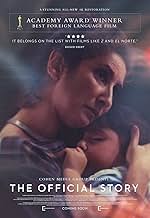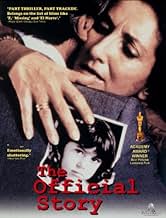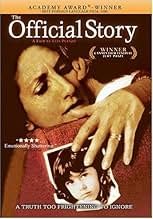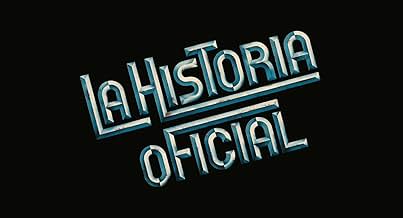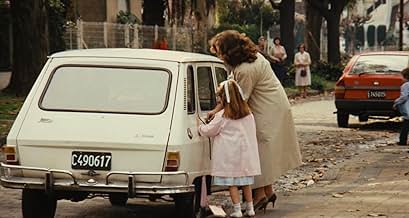AVALIAÇÃO DA IMDb
7,7/10
11 mil
SUA AVALIAÇÃO
Durante os últimos meses da ditadura militar argentina em 1983, uma professora do ensino médio tenta descobrir quem é a mãe biológica de sua filha adotiva.Durante os últimos meses da ditadura militar argentina em 1983, uma professora do ensino médio tenta descobrir quem é a mãe biológica de sua filha adotiva.Durante os últimos meses da ditadura militar argentina em 1983, uma professora do ensino médio tenta descobrir quem é a mãe biológica de sua filha adotiva.
- Direção
- Roteiristas
- Artistas
- Ganhou 1 Oscar
- 25 vitórias e 9 indicações no total
- Direção
- Roteiristas
- Elenco e equipe completos
- Produção, bilheteria e muito mais no IMDbPro
Avaliações em destaque
Adoption can be a harrowing business at the best of times, and the final scene of 'La Historia Oficial' probably represents The End of the Beginning rather than The Beginning of the End. The real drama almost certainly still lies ahead when sweet little moppet Ana discovers the reality about her parents; as teenaged Ann Blyth traumatically did thirty-five years earlier in the Goldwyn production 'Our Very Own' (1950).
10jereco
I cry each time I watch this film. (The scene with Norma Aleandro and the baby clothes) Always gets me. An American film-maker would have made a film about one of the "desaparecidos" (disappeared ones) - but Puenzo is too sharp for that - by making a film about one of the quietly complicit, he has indicted all of us who are aware that things aren't quite right in the world, but choose to ignore the fact...and do nothing. Devastating, political and yet personal. My all-time favorite film.
Its hard to convey just how moving this movie is. Its absolutely haunting, I thought about this flick for days afterwards. I don't think it represents the experiences of many Argentines during the era of the juntas, but it clearly shows how awful those times were and why Argentines never want to return to that situation again.
In the powerful 1985 film The Official Story, Director Luis Puenzo tells the story of a teacher's awakening to conscience at the end of Argentina's "Dirty War" of the late 70s and early 80s. As in Pinochet's Chile, the military secret police sought to consolidate their power by routinely torturing and murdering students, political activists, opponents of the regime, and even expectant mothers. Many ended up as desaparecidos, people taken by the government and not returned. The film is about one mother's search for the truth about her adopted daughter and her discovery brings harsh political reality very close to home.
In The Official Story, Alicia (Norma Aleandro) lives a comfortable middle class life. She teaches History to high school students and enjoys a family that includes her well-to-do husband Roberto (Hector Alterio) and 5-year old adopted daughter Gaby (Analia Castro). Not used to asking questions, she believes whatever she has read in history books and is confused when one of her students tells her that "history is written by assassins." She sees the demonstrations of the "Mothers of Plaza de Mayo", a group seeking information about missing family members but remains uninvolved. When her friend Ana (Chunchuna Villafane) visits after living in exile for many years, however, she learns, in an intensely emotional scene, that Ana had been imprisoned and tortured by the police trying to locate her husband, a suspected "subversive".
Ana tells Alicia that many others had "disappeared" and that babies had been taken from their mothers and given to childless friends of the junta. Alicia begins to wonder if her own child was the daughter of a political victim and questions her husband but when he is evasive, she suspects that he may be hiding a dark secret. Although fearful at the prospect of losing Gaby, Alicia is determined to find out about her daughter's past and begins to search hospital records and government archives. Ultimately, she must confront her own responsibility in a climax of shattering force that underscores the tragedy of political ideologues who would rather destroy family solidarity than risk losing power.
In The Official Story, Alicia (Norma Aleandro) lives a comfortable middle class life. She teaches History to high school students and enjoys a family that includes her well-to-do husband Roberto (Hector Alterio) and 5-year old adopted daughter Gaby (Analia Castro). Not used to asking questions, she believes whatever she has read in history books and is confused when one of her students tells her that "history is written by assassins." She sees the demonstrations of the "Mothers of Plaza de Mayo", a group seeking information about missing family members but remains uninvolved. When her friend Ana (Chunchuna Villafane) visits after living in exile for many years, however, she learns, in an intensely emotional scene, that Ana had been imprisoned and tortured by the police trying to locate her husband, a suspected "subversive".
Ana tells Alicia that many others had "disappeared" and that babies had been taken from their mothers and given to childless friends of the junta. Alicia begins to wonder if her own child was the daughter of a political victim and questions her husband but when he is evasive, she suspects that he may be hiding a dark secret. Although fearful at the prospect of losing Gaby, Alicia is determined to find out about her daughter's past and begins to search hospital records and government archives. Ultimately, she must confront her own responsibility in a climax of shattering force that underscores the tragedy of political ideologues who would rather destroy family solidarity than risk losing power.
La Historia Oficial is an excellent movie. It is also the testimony of the suffering of the Argentinian people during the military dictatorship. But those who are not from Argentina, like myself, can very well be touched by this movie. I was observing the cruelty of the government and thought "my God, totalitarism is always the same, and no matter if the violation of human rights occurs in Argentina under the military regime, in Cuba under the Castro dictatorship, in Chile under Pinochet, in Europe during Hitler, people suffer the same and the least we can do is to feel compassion". A good lesson from this movie, generation after generation we shouldn't forget the victims. They deserve justice.
Você sabia?
- CuriosidadesThe filming began in 1983, the same year that the military dictatorship ended in Argentina. The filming was cancelled due to the threats received by the director, actors and particularly to Analia Castro's family. It was announced that filming was cancelled, but production continued in secret until 1985.
- Versões alternativasThe 2015 restoration is extended by 2 minutes due to the inclusion of restoration credits at the beginning and end of the film. The opening restoration credits play over the opening scenes in Alicia's classroom. During the restoration end credits, the background goes black and the instrumental version of 'El país de nomeacuerdo' is looped.
Principais escolhas
Faça login para avaliar e ver a lista de recomendações personalizadas
- How long is The Official Story?Fornecido pela Alexa
Detalhes
Bilheteria
- Faturamento bruto nos EUA e Canadá
- US$ 29.426
- Fim de semana de estreia nos EUA e Canadá
- US$ 29.426
- 10 de nov. de 1985
- Faturamento bruto mundial
- US$ 69.832
Contribua para esta página
Sugerir uma alteração ou adicionar conteúdo ausente


